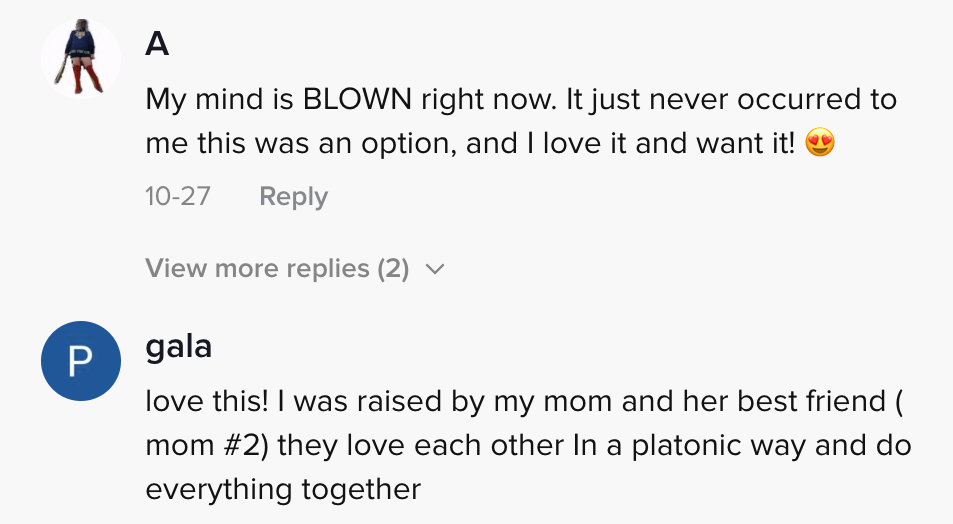It's honestly a beautiful love story. April Lee and Renee Wong met when they were preteens, right around 12 or 13, and have remained a constant fixture in each other's lives for the past 11 years.
It's romantic — they know it, and April is the first to self-identify the pair as a set of "hopeless romantics" — but there's no romance involved. There's love, understanding, patience, respect, and communication, but nothing physical. April and Renee are platonic life partners, aka friends who choose to journey through life together without a sexual component to their relationship.

Many commenters on April's video expressed their own interest in pursuing a platonic life-long relationship, and some shared that they grew up or were raising children in similar environments:

@IAmBumblebee Yes, my best friend and I moved away from our hometown and got our own apt together. She helps me raise my two kids and we legit do every single thing together except work at the same place. I have no romantic feelings towards her but I know she’s my literal soulmate
This form of commitment appears to be becoming more common. Recently, one standout story included a group of seven women who had been best friends for over 20 years. Reaching their retirement age, the group pooled their money together and purchased a $580,000 home with enough rooms for each individual. There, they plan to spend the rest of their lives together.

But not everyone is convinced these arrangements work. "She's gonna find a man, get married, and leave your ass high and dry," one user wrote, addressing April. But how is that any different from the chances we take with romantic relationships, where cheating, lying, or simply growing apart is common?
@IAmBumblebee She gonna find a man, get married and leave your ass high and dry
To gain a better understanding of the dynamics and differences of romantic and platonic relationships, I spoke with marriage and family therapist MoAndra Johnson, who specializes in sex and relationships.
Johnson defined platonic relationships as: "A relationship between friends, and while these relationships can be loving, they are not physically intimate. They, however, may exhibit other forms of intimacy and create a bond just as strong. A platonic relationship may consist of one or all of these forms of intimacy: emotional intimacy, intellectual intimacy, creative intimacy, experiential intimacy, [and/or] spiritual intimacy."
"Platonic love derives from Plato’s analogy that platonic love teaches us to pursue greater goals and essentially motivate each other to become the best versions of ourselves," she told BuzzFeed.
"[Platonic] relationships are becoming more common," Johnson noted. "Many people today are breaking out of the typical societal molds to discover what makes them happy, [and] that may not be conventional romantic monogamy."
"A platonic life partnership [offers] love and support, the feeling of belonging to a community or having a village that's not strictly romantic," she continued. "This kind of relationship is healthy, [but] different individuals have different needs. Platonic relationships are possible just so long as both people’s intentions and understanding of the relationship are the same."
For these relationships to remain stable, Johnson says it's important to "set boundaries" and "avoid blurred lines by clearly outlining what works best" for each partner. The main concern is that one partner may develop romantic, unrequited feelings for the other, creating a situation that may lead to the relationship fully dissolving.
"One has to be open and honest with the person you're sharing this relationship with," Johnson added, just as you might in a romantic relationship, but without the physical intimacy.
Her words sound familiar. When BuzzFeed spoke to April about her relationship with Renee, she said: "We’ve put a lot of effort into communicating and listening to each other without judgement. ... It feels like a life hack. Everything we want to achieve, we realized we can achieve it together. And if we did what romantic couples do — pooling together our resources, sharing responsibilities, making up for where the other lacked — we could achieve our goals a lot easier and have a lot more fun along the way."
This type of love can sound perfect and sometimes effortless, but Johnson pointed out a potential con. Unlike long-term romantic relationships, which have long been a standard in our society, life-long platonic relationships may be harder for others to understand, which can lead to conflict among a pair's family, friends, and outsiders.
"A common con that I have come across as a therapist is the negative perspective of others," Johnson said. "As society advances, we are exploring other ways to do life outside of cultural norms, [and] there's no right or wrong way. However, fairly new relationships may challenge those around you."

